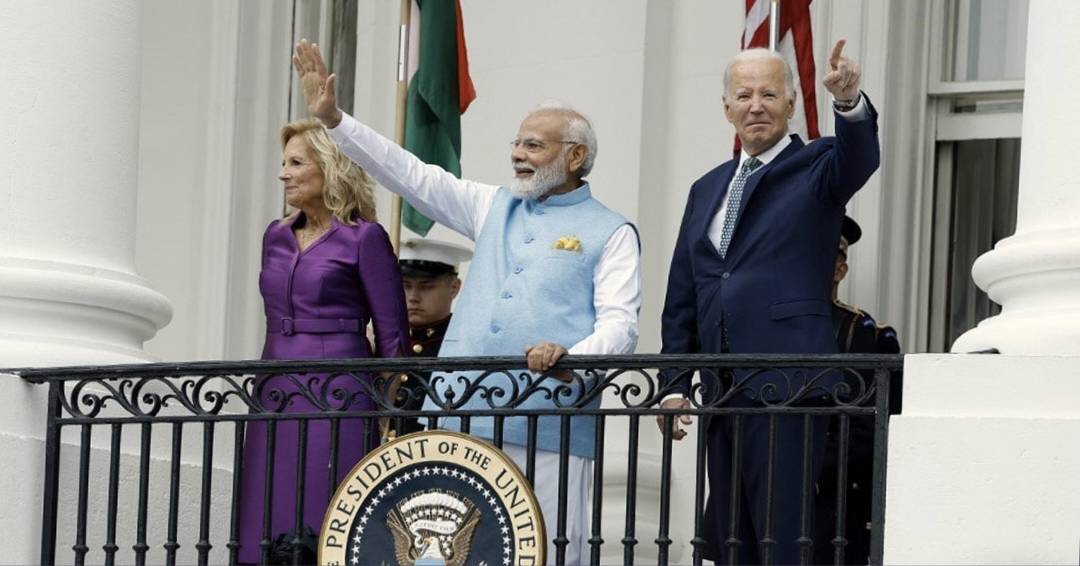
During Prime Minister Narendra Modi’s ongoing state visit to the United States, technology cooperation emerged as a prominent topic of discussion between India and the US, according to Foreign Secretary Vinay Mohan Kwatra. Mr. Kwatra highlighted the “exceptional warmth and hospitality” extended to PM Modi by US President Joe Biden and First Lady Jill Biden. He emphasized that advanced technology, spanning defense, space, and energy, stood out as one of the most significant outcomes of the visit. In a media briefing, Mr. Kwatra stated, “Very clearly, technology, in particular advanced technology, across all domains ranging from defense to space and energy is one of the most important substantive outcomes.”
As part of the collaboration in technology, India and the US launched public-private Joint Task Forces focused on Open Radio Access Networks (RAN) and advanced telecoms research and development. Joint research between the public and private sectors in both countries will be facilitated through the establishment of the Joint Indo-US Quantum Coordination Mechanism, specifically targeting quantum, advanced computing, and artificial intelligence. To support the US-India Initiative on Critical and Emerging Technology (iCET), the US-India Commercial Dialogue will initiate an “Innovation Handshake” to connect the startup ecosystems of both countries.
In terms of diplomatic expansion, it was agreed that the US would initiate the process of opening two new consulates in India (Ahmedabad and Bengaluru), while India would open its consulates in Seattle and two other locations. PM Modi held discussions with President Biden, focusing on crucial issues such as climate change, trade, and regional security. The visit resulted in significant agreements and partnerships, particularly in the technology, healthcare, and defense sectors, further strengthening the strategic partnership between India and the United States.
Mr. Kwatra highlighted the comprehensive nature of technology cooperation, stating, “Technology featured in talks, not in a limited way but technology cooperation across the ecosystem. This included technology transfer, services, and working together in research among other domains.” He also noted the investment by American chipmaker Micron Technology, with support from the India Semiconductor Mission, to establish a new semiconductor assembly and test facility in India, amounting to more than $800 million.
Describing the visit as “extremely rich in form and equally, if not more, rich in substance,” Mr. Kwatra emphasized the visit’s achievements, including the defense sector. He mentioned the signing of an MoU between GE and HAL for the production of GE 414 aero-engines for India’s light combat aircraft. Additionally, India joined the Artemis Accords, a US-led initiative aimed at returning humans to the moon by 2025 and expanding space exploration to Mars and beyond. India’s partnership in the accords will involve joint training of Indian Space Research Organization (ISRO) astronauts by NASA, with a goal of launching a joint effort to the International Space Station in 2024.
The joint statement between the two leaders identified approximately 20 to 25 areas of technology partnership as a direct outcome of their discussions at the White House. Furthermore, the US welcomed India as the newest partner of the Minerals Security Partnership (MSP), aimed at accelerating the development of diverse and sustainable critical energy minerals supply chains globally through targeted financial and diplomatic support.
During the discussions with President Biden, PM Modi emphasized the need for the international community to address the challenge posed by those who sponsor and support terrorism. Mr. Kwatra highlighted PM Modi’s statement that terrorism remains a pressing challenge for the global community, emphasizing the necessity to deal firmly with those who engage in such activities.
The state visit of Prime Minister Narendra Modi to the United States has yielded significant outcomes in the domains of technology, defense, and space. The discussions and agreements reached between India and the US reflect a deepening strategic partnership and pave the way

Post Your Comments